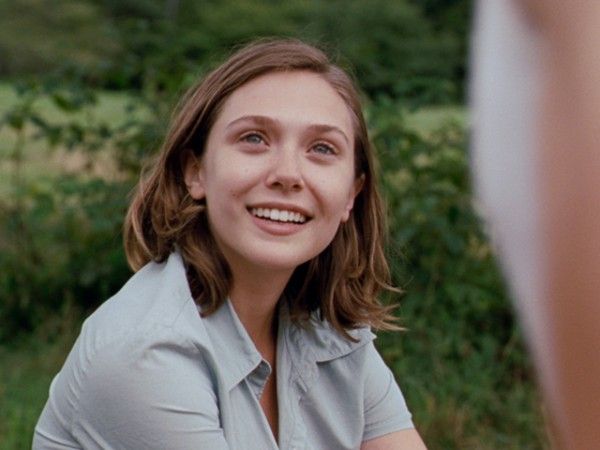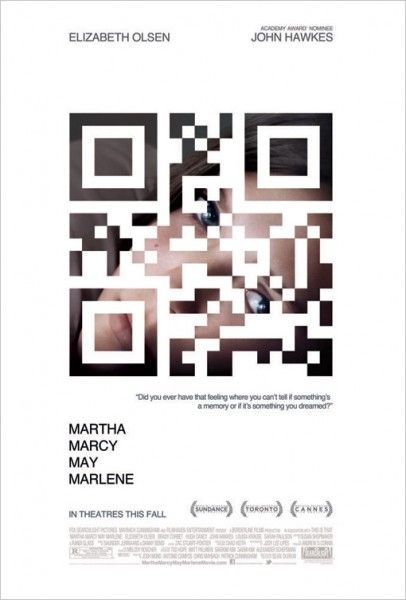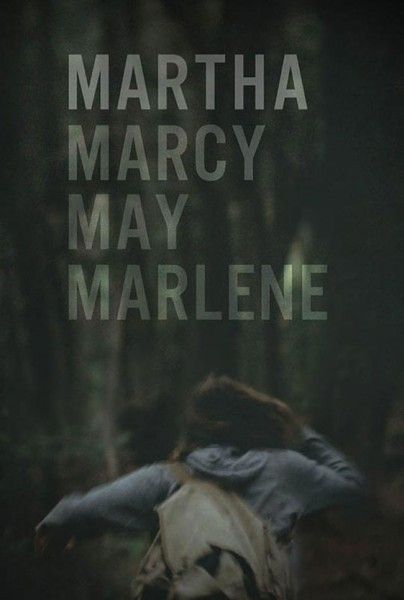Martha Marcy May Marlene is a psychological thriller about a young woman (Elizabeth Olsen) who escapes the confines of a rural cult-like farming community and rejoins her old life when she calls the estranged sister (Sarah Paulson) she hasn’t seen in years. Trapped by her own devastating memories, and consumed by paranoia and guilt, she is unable to act in a way others find normal. Although she is seemingly safe, her secrets hold her captive and nothing feels like home.
At the film’s press day, actress Elizabeth Olsen talked about the star-making debut performance, her desire to focus on what was on the page rather than speaking to any real survivors, how she is able to keep herself very separate from her roles, what she thinks of the film’s ambiguous ending, and how she’s always wanted to be an actress, but just went about it in a different way than her famous sisters, Mary-Kate and Ashley. Check out what she had to say after the jump:
Question: What concerns did you have about making this, when you first read this script? Was there any doubt, or were you completely engaged from the second you flipped the script open?
ELIZABETH OLSEN: I was new, young and naive, and I just really wanted the job.
Because of the unrevealed nature of a lot of the story, was there a fine line between how much to research and discover about that kind of lifestyle, and how much to just play what was on the page?
OLSEN: I tried to focus on what was on the page. I did ask (writer/director) Sean [Durkin] a few questions about research that he had done. He was an open source for everyone, if we had questions about the characters or anything. He said that he had all the answers ‘cause he’d figured it all out, but he didn’t want to just throw information at us. He wanted us to only use him when we needed to. He didn’t want to micro-manage. So, there were times when I would use his information or who he spoke with to my advantage. I also feel like, if I had talked to someone who inspired some of the events in the story, or the emotionality of the story, I would feel like I owed them reverence, in a weird way. I’d want to tell their story, and this is a made-up story from Sean’s imagination. I just wanted to focus on the story that he was trying to tell, that was on the page. There also wasn’t really much time, which was to my advantage because I didn’t second-guess all these things.
Did you find it odd that another woman would tell Martha that this brutal initiation into this community was okay, instead of saying that it was outrageous?
OLSEN: That’s what I think is really smart about it. It’s not Patrick (John Hawkes) saying that you have to go through it. It’s these women who become your close friends, and they’re telling you that you’re selfish, if you do something else. If you play against it, that’s you being selfish and not being part of the group. If you want to be part of the group, you have to trust everything that’s happening. There are ways that we all do that in our lives, in much different situations, but that happens. All those tactics happen, everywhere. That’s what’s so scary about it. I know that was a common thing, in Sean’s research. It wasn’t just these men, or authority figures, making you do certain things, but it’s the group. They’re all trusting this idea.
In this film, you had to run, swim and do a lot of physical labor. Did you have any idea how exhausting this was going to be, when you read it?
OLSEN: I think I did, and I wanted to be exhausted. The swimming part was tough because I don’t really like water that much, to tell you the truth. I’d rather be hiking and in the desert. Beaches and lakes aren’t the most appealing thing to me, but Martha finds peace and comfort in the water, so I had to swim a lot. A lot of it is not even in the movie. The reality of that was more surprising than anything else. There was a day towards the end of the shoot that was really cold, but it made for a better shot. It told the story better, so you suck it up and do it, and you just try to get it in one [take]. That’s all you can do. I had to do a signal when I was literally could not go any further, so they had a boat come pick me up. I wish I could have made it all the way back to the dock and gotten out, and then that would be the end of the shot, but it was too difficult.
You get so immersed in Martha’s world, in watching this film. Did you ever get depressed while filming it?
OLSEN: Not really, no. I keep myself very separate from what I work on. It’s very clear in my head that I’m not the person that I’m pretending to be. When you have to relate, in some way, you have harder and more draining days than others, and certainly you get more tired than other days. It was emotionally exhausting, but we had a great family and we had a lot of fun doing it. It didn’t feel like it was heavy, all the time.
After getting a great reception at so many film festivals, are you relieved for general audiences to finally get to see it?
OLSEN: I’m really excited to have a general audience see it, and not just people who go to festivals and journalists, and people who are true film lovers. I’m really excited to hear what they think about it. What I think is so fascinating about this film is that it’s a new cinematic experience. It’s a new way of telling a story. It’s something that we’re not used to. So, that’s why I’m more interested for people like my father to see the movie. When he saw it, I knew he was going to be frustrated that things weren’t tied up at the end. He likes old westerns and old films, and that’s really about it. Apparently, he loved Winter’s Bone, though, so maybe I was underestimating what he enjoys. So, I knew that he was going to be frustrated with that, and he was, but he liked it, and not just ‘cause I’m his daughter. He thought it was an interesting story, and the thought it was deeply disturbing, but he enjoyed watching it, and he enjoyed not knowing what was going to happen and not really understanding everything. I hope that other people, who just like going to see movies, will have that experience, and not just fight against it, but be game for it.
Your character believes in something, but then things change and she escapes from those beliefs? Have you ever had a similar experience?
OLSEN: Nothing that I can think of comes to mind. The only thing I can really say to that is that Martha’s whole battle is to find a sense of belonging and purpose and acceptance, and I think that everyone tries to figure that out, in some way or another. That journey continues to change, as you grow. I know Sean equates it to a soccer team, or going to church school, or even finding a community in your job. This is someone who had no community at all, whatsoever. For me, personally, I always felt that I had a community, among my friends. I’ve had the same friends since kindergarten, so I’ve been lucky, in that sense.
Did you come up with your own version of what might have happened at the end of the film?
OLSEN: I never thought that there should be another ending. It literally never came up, in filming. We never thought that that was a problem, or something that would cause so much [conversation]. With the questions at the end, about what’s happening, or whether they’re after her or not, were all questions that, simultaneously, are the questions that Martha is supposed to be having, at the end, as well. If those questions do align with the audience, then that’s the success of Sean trying to make everyone see the film through her psychological experience.
Do you hope that this film will open conversations for people trapped in these situations?
OLSEN: Yeah, a lot of people have talked to Sean and I. In eight out of 10 cities that we went to on our press tour around the states, people would share their stories. A lot of people had their own story to tell, about whether they were involved in a cult, or their sister, or their best friend. I didn’t have any hopes for that, though. I always just thought of it as an isolated story.
Don’t you think that this could also start a conversation about PTSD?
OLSEN: Yeah, right. And abuse, and loss of voice. I think it could ring true for many different reasons. That’s why I didn’t personally feel it necessary to do all this research about this one woman’s experience in a cult. I do think there are so many other ways to relate to this film, and I certainly related to it, in completely different ways that are nonsensical with this storyline.
Do you find that people have trouble remembering the title of this film?
OLSEN: Yes. When people ask me the title of the film, I say, “Well you’re not going to remember it, but you will remember that it has lots of M’s. It’s Martha Marcy May Marlene.” They say, “That’s not that hard.” Then, they try to say it and they ruin it. But, they won’t forget a movie that’s at the box office with four M’s in it. They’re not going to mix it up with anything.
Your famous sisters, Mary-Kate and Ashley, were child actors, but you decided to wait until later, and you went to college to get your degree. Did your sisters influence your decision to act, at all?
OLSEN: I’m still trying to get my degree. Maybe somehow they did influence me, but I never made choices based on the choices they made. I just always made choices based on following how my path was going. Obviously, your family influences you, in every choice you make, in some way or another, but it was nothing that was really thought out. It was just something that I always wanted to do, and I went about it a different way. I was in a position where I could go about it in a different way.
Did you always want to be an actress?
OLSEN: Yeah, I did. I was a theater camp kid. It’s all that my friends and I did. We were always creating movies and plays on the playground. Instead of playing on the playground, we were rehearsing musicals that we wrote. I was always surrounded by creative people, growing up here in the Valley, and I just had teachers who were really great in high school and that gave me the confidence to pursue it for real, as opposed to a fun fantasy.





